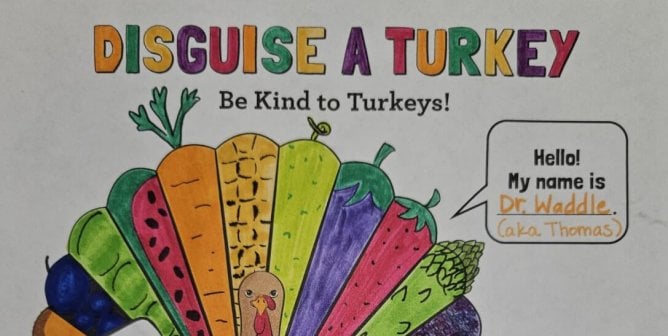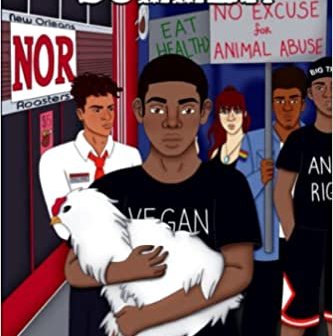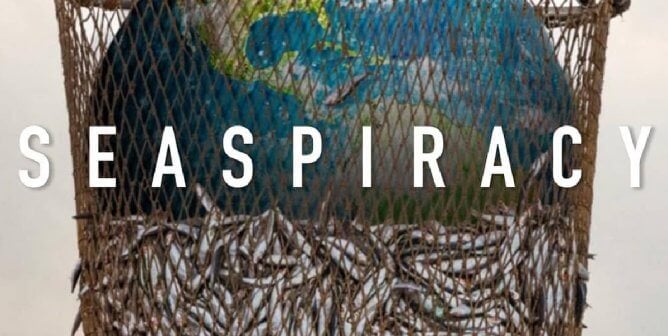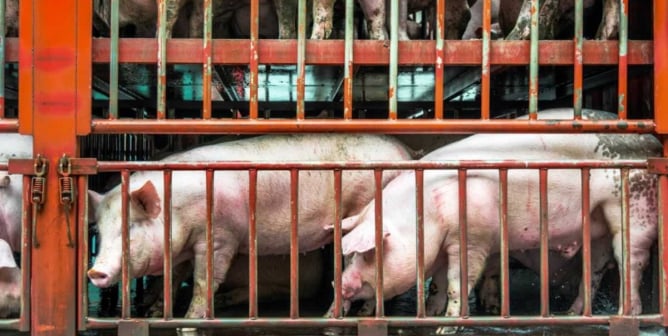Don’t Be Fooled by the Dairy and Egg Industries’ Misleading Classroom Resources
Most educators would agree that when young people are presented with a topic at school, they should receive a balanced perspective and accurate, honest information that serves their best interests. So naturally, when the dairy and egg industries—which directly profit from the routine abuse and exploitation of animals—start peddling “educational” resources to market their “products” to young people in a school setting, it should raise red flags.

Millions of students are force-fed regular doses of meat-, egg-, and dairy-industry propaganda in the form of “educational” materials—such as posters, lesson plans, and presentations—supplied to educators by trade groups. Since these industries’ job is to make profits and not provide useful nutritional information, the materials that they distribute neglect to tell impressionable kids about the health hazards inherent in high-fat diets based on animal-derived foods or about the cruelty to animals that’s rampant in these industries. Instead, they whitewash the gruesome details of exploited animals’ lives and claim that their foods are an essential part of a healthy diet—a claim that’s contrary to what we know about nutrition today.
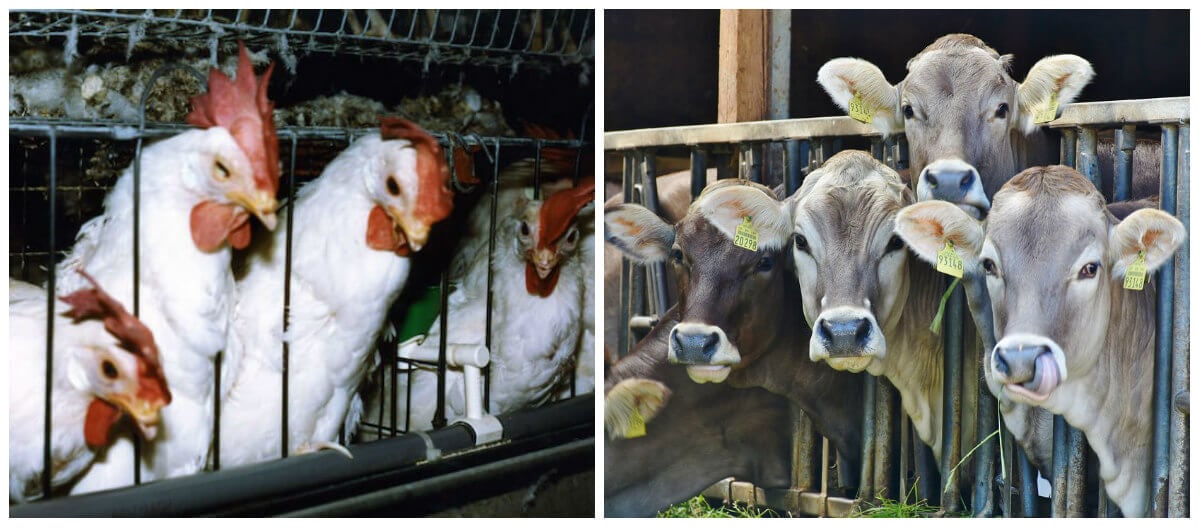
PETA has received many reports from concerned teachers, parents, and community members who were disturbed after finding that schools were hosting representatives from the dairy and egg industries, touting their lesson plans and resources, and even allowing live cows to be transported to their campuses for misleading displays about dairy farms. One parent—whose child’s elementary school in Alameda, California, hosted a live-cow demonstration in December 2017—said: “I was so upset and disappointed to find out about this presentation. I’m vegan, and I try to talk honestly with my son about where animal-derived food comes from. He came home from school under the impression that the milk he sees in the grocery store comes from hand-milked, happy cows—which couldn’t be more false. I’ve shared my concerns with his teacher and the administration, so hopefully the Dairy Council and their pro-milk myths won’t be welcome again.”
Misleading Health Information
By the age of 3, many children who follow a typical Western diet laden with animal-derived foods are already developing the fatty deposits in their coronary arteries that can eventually lead to heart attacks—yet some schools seem keen to allow and help these industries promote their damaging products.
Cow’s milk is the number one cause of food allergies among infants and children, and millions of Americans are lactose-intolerant. Studies suggest that milk consumption may also contribute to asthma, recurrent ear infections, constipation, iron deficiency, anemia, juvenile-onset diabetes, and even cancer. Dairy “products” are loaded with artery-clogging cholesterol and saturated fat.
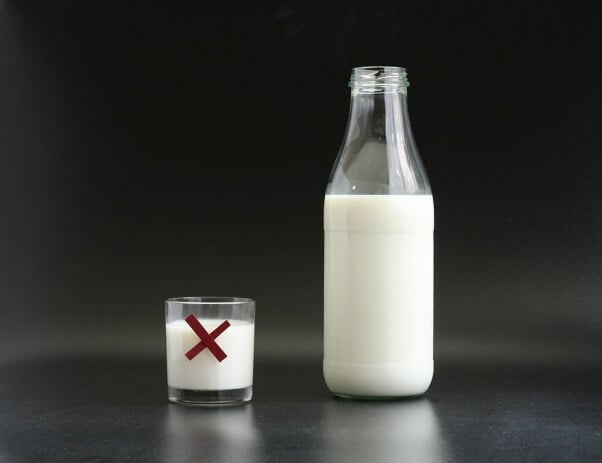
Eggs are no better. These cholesterol bombs are the second top cause of food allergies in children, just after milk. About 70 percent of the calories in eggs are from fat—most of that being saturated fat, which raises your risk of developing heart disease, strokes, and other diseases. And a single egg can have up to a whopping 230 milligrams of cholesterol—yet the 2015 Dietary Guidelines Advisory Committee notes that it’s unnecessary to eat any cholesterol at all and recommends that people consume as little dietary cholesterol as possible.

Schools wouldn’t dream of encouraging kids to smoke or drink alcohol. Shouldn’t we have the same standards for the food that we eat? Lifelong eating habits are formed during childhood, and we shouldn’t tolerate dairy and egg industries that target children any more than we would tolerate cigarette companies that encourage children to smoke. Instead, we should start kids on the road to a healthy, humane lifestyle by presenting them with a well-rounded view of where food comes from and teaching them to make smart eating choices that will serve them throughout their lives. Industries that are only interested in making a buck at the expense of people’s health and animals’ lives are never going to be a sensible source of information for children.
Whitewashing Cruelty to Animals
It should come as no surprise that these industries also neglect to paint an accurate portrait of the extreme suffering endured by cows and chickens on dairy and egg farms.
Children are inherently compassionate toward animals, but most of them know nothing about the suffering behind animal-derived foods. Most cows used in the dairy industry are forced to live in cramped, filthy conditions, often surrounded by their own waste. They’re bred and sometimes pumped full of hormones that force them to produce 4.5 times the amount of milk that they would produce naturally. These cows are treated as nothing more than milk machines—they endure a constant cycle of being forcibly impregnated, only so that their calves can be torn away from them within hours of birth. Instead of nursing their babies, mother cows are hooked up to painful milking machines several times a day. Once their milk production wanes, at about only 4 or 5 years old, they’re sent to slaughter.
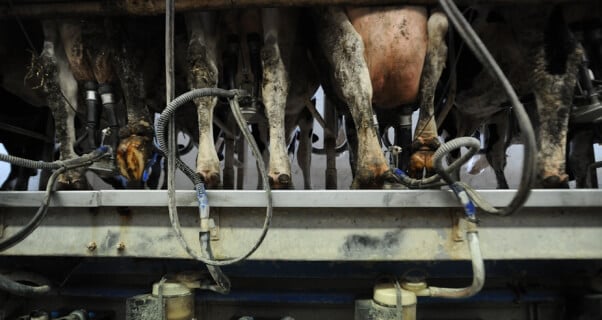
About 360 million hens are raised for eggs in the U.S., and most spend their lives in tiny battery cages, stacked one on top of the next in huge warehouses, in which they barely have room to turn around. The wire mesh of the cages rubs off their feathers, chafes their skin, and causes their feet to become crippled. Millions of day-old male chicks are killed (usually in a high-speed grinder called a “macerator”) every year because they can’t lay eggs and are therefore considered worthless. Hens raised for their eggs are exhausted, and their egg production begins to wane when they’re about 2 years old, at which point they’re slaughtered—whereas those in the wild may live for over a decade. More than 100 million “spent” hens are killed in slaughterhouses every year.
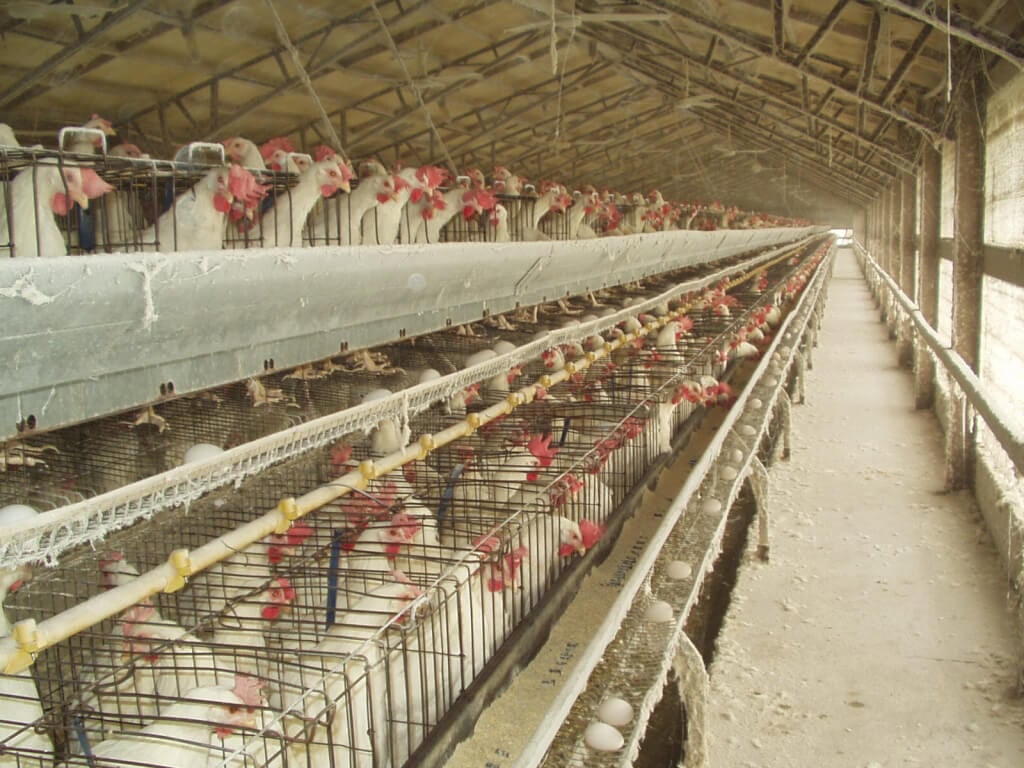
While it’s not shocking that the dairy and egg industries choose to gloss over these details—as presenting the reality about the ways in which cows and chickens are exploited for dairy “products” and eggs wouldn’t exactly help sales—this sort of whitewashing of the facts certainly has no place in education. If the truth about our food is too gruesome to share with our children, then surely, these products should not be promoted or fed to them.
Taking Advantage of Teachers and Marketing Unhealthy Products to Children
Essentially, these big businesses are taking advantage of teachers who need free classroom resources—and, in turn, pushing their misleading propaganda on students in an effort to boost sales and make a bigger profit. It’s a shameful marketing tactic that’s being promoted under the guise of education. That’s all there is to it.
But it’s nothing new for Big Agriculture to push its propaganda on schoolchildren. Look at school lunches, for example. For decades, Big Ag has been actively making animal-derived foods an integral part of the American diet by striking deals with the U.S. government, which has spent $38 billion per year to subsidize the meat and dairy industries. Basically, your tax dollars go to buying up excess animal parts to keep these industries from going out of business.

“Milk education programs” and dairy-heavy nutritional guidelines in schools date back many decades, but the underlying motivation to boost dairy consumption is always—you guessed it—money. And the dairy industry spends millions of dollars on both lobbying and marketing campaigns.
***
Schools have a responsibility to present all sides of an issue to students and provide them with accurate information about the world. By teaching students about food using only resources created by the dairy and egg industries—which profit directly from cruelty to animals and their continued exploitation—or inviting their representatives into classrooms, educators aren’t giving students the opportunity to engage in higher-order thinking or understand the entirety of the issue.
Your students deserve better. Please say no to the dairy and egg industries’ “educational” materials and promotions and encourage other educators to do the same.

